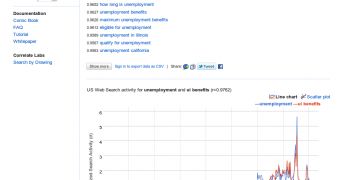It couldn't have come at a better time, new research by the Bank of England revealed that Google search data can be a very accurate indicator of market and general economic trends, ranging from unemployment rates to house values, soon after Google released a tool for just this kind of use.
According to a new report by researches employed by the Bank of England, there is a strong correlation between certain search terms and movements in the market.
So much so as the searches can be used as a way of predicting where several economic indicators are heading, sometimes with better accuracy than other data sources used until now.
The data is also a lot fresher than what people are used to, searches can be days or even hours old, while waiting for surveys or monthly reports is only going to give you an image of what the market looked like a few weeks or more ago, not what it looks like at the moment.
The research focused on two areas in particular, unemployment rates and house prices, but the results are relevant for a wider range of economic metrics, the researchers believe.
"Internet search data can help to predict changes in unemployment in the UK. These appear to be as useful as existing indicators. For house prices, the results are somewhat stronger: search term variables can outperform some existing indicators over the period since 2004," the researchers say.
The new research comes just as Google released Correlate a tool which aims to give users the data needed for just this type of research. Google provides aggregated search data for several years and enables researchers to compare it to their own data sets, to see if there is any correlation.
"In contrast to most traditional survey methods, they are collected as a by-product of normal activity, rather than requiring individuals or firms to respond to survey questions after the event," the researchers added.
"This can avoid problems associated with non-response or inaccurate responses. And it also means that information is collected on a wider range of issues. As a result, search data can help analyze issues that arise unexpectedly."

 14 DAY TRIAL //
14 DAY TRIAL //